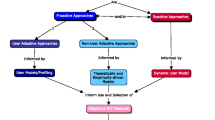Abstract
This paper considers how research into empathy in teaching and learning can inform the research into intelligent systems and intelligent agents embedded in educational applications. It also relates this research to some analysis of classroom practice completed as part of the EU funded NIMIS project. The project is developing three applications, one of which aims to support writing development with young children aged 5-6 years based on a cartoon format. The NIMIS classroom as a whole is designed to enhance and augment existing classroom practices and to foster collaboration by non-intrusive hardware and intuitive hardware and software interfaces. To this end it seeks to enhance both human and electronic communication in the classroom. Empathy is central to ensuring the quality of human communication and personal development. This paper suggests that intelligent systems that can consider more carefully the processes and feelings involved in human interactions in teaching and learning, may promote higher quality support for students in classrooms.
Access this chapter
Tax calculation will be finalised at checkout
Purchases are for personal use only
Preview
Unable to display preview. Download preview PDF.
Similar content being viewed by others
References
Aspy, D.: Towards a Technology for Humanising Education. Research Press, Champaign Illinois (1972)
Bennet, N., Dunne, E.: How Children Learn — Implications for Practice. In: Moon, B., Shelton-Mayes, A. (eds.) Teaching and Learning in the Secondary School, ch. 6. Routledge, London (1994)
Cassell, J., Thórisson, K.R.: The power of a nod and a glance: Envelope vs. emotional feedback in animated conversational agents. Applied Artificial Intelligence 13(4/5), 519–538 (1999)
Claxton, G.: Hare Brain Tortoise Mind. Fourth Estate Ltd., London (1997)
Cooper, B.L.: Communicating values via the ‘hidden curriculum’ — messages from the teacher? In: The Fourth Annual Conference on Education, Spirituality and the Whole Child. Roehampton Institute, London (1997)
Cooper, B.L.: Exploring moral values — knowing me, knowing you.. aha! — rediscovering the personal in education. In: The Fifth Annual Conference on Education, Spirituality and the Whole Child. Roehampton Institute, London (1998)
Cooper, B.L.: Disingenuous teachers, disenchanted learners — in search of authenticity in teacher/pupil relationships. In: The 4th Annual Conference of the European Learning Styles Information Network. University of Central Lancashire (1999)
Cousin, G., Davidson, A.: Information technology and the affective domain. In: The 4th Annual Conference of the European Learning Styles Information Network. University of Central Lancashire (1999)
Goleman, D.: Emotional Intelligence. Bloomsbury, London (1995)
Du Boulay, B., Luckin, R., del Soldato, T.: The plausibility problem: Human teaching tactics in the ‘hands’ of a machine. In: Lajoie, S.P., Vivet, M. (eds.) Artificial Intelligence in Education: Open Learning Environments: New Computational Technologies to Support Learning, Exploration and Collaboration, pp. 225–232. IOS, Amsterdam (1999)
Fraser, V.: The importance of story in children’s learning: The lessons of research. The Use of English 50(1) (1998)
Gardner, H.: The Unschooled Mind. Fontana, London (1993)
Goodman, B., Soller, A.L., Linton, F., Gaimari, R.: Encouraging student reflection and articulation using a learning companion. International Journal of Artificial Intelligence in Education 9, 237–255 (1998)
Hesten, S.: The Construction of an Archive (on Heathcote). Unpublished PhD thesis, Lancaster University (1995)
Hoffman, M.L.: Moral development. In: Mussen, P.H. (ed.) Carmichael’s Manual of Child Psychology. Wiley, New York (1970)
Isbister, K., Nass, C.: Consistency of personality in interactive characters: Verbal cues, non-verbal cues and user characteristics. International Journal of Human Computer Studies (in Press)
Johnson, W.L., Rickel, J.W., Lester, J.C.: Animated pedagogical agents: Face to face interaction in interactive learning environments. International Journal of Artificial Intelligence in Education 11 (2000) (to appear)
Kozeki, B., Berghammer, R.: The role of empathy in the motivational structure of school children. Personality & Individual Difference 13(2), 191–203 (1992)
Lepper, M.R., Chabay, R.W.: Socializing the intelligent tutor: Bringing empathy to computer tutors. In: Mandl, H., Lesgold, H. (eds.) Learning Issues for Intelligent Tutoring Systems, pp. 242–257. Springer, New York (1988)
Department of Education and Science. Discipline in Schools. HMSO, London (1989)
Moon, B., Shelton-Mayes, A.: Teaching and Learning in the Secondary School. Routledge, London (1994)
National Commission on Education. Success Against the Odds: Effective Schools in Disadvantaged Areas. Routledge, London (1996)
Paiva, A., Machado, I., Martinho, C.: Enriching pedagogical agents with emotional behaviour — the case of Vincent. In: AIED 1999 Workshop on Animated and Personified Pedagogical Agents. pp. 47–55, Le Mans (1999)
Purkey, W.W.: Self-concept and School Achievement. Prentice-Hall, Englewood Cliffs (1970)
Robertson, J., Good, J., Pain, H.: BetterBlether: The design and evaluation of a discussion tool for education. International Journal of Artificial Intelligence in Education 9, 219–236 (1998)
Rogers, C.R.: Empathic: An unappreciated way of being. The Counselling Psychologist 5(2), 2–10 (1975)
Vygotsky, L.: Mind in Society: The Development of Higher Psychological Processes. Harvard University Press, Cambridge (1978)
Wood, D.: How Children Think and Learn. Understanding Children’s Worlds. Blackwell Publishers, Oxford (1988)
Zimmer, B.: The empathy templates: A way to support collaborative learning. In: Lockwood, F. (ed.) Open and Distance Learning Today, vol. 14. Routledge, London (1995)
Author information
Authors and Affiliations
Editor information
Editors and Affiliations
Rights and permissions
Copyright information
© 2000 Springer-Verlag Berlin Heidelberg
About this chapter
Cite this chapter
Cooper, B., Brna, P., Martins, A. (2000). Effective Affective in Intelligent Systems – Building on Evidence of Empathy in Teaching and Learning. In: Paiva, A. (eds) Affective Interactions. IWAI 1999. Lecture Notes in Computer Science(), vol 1814. Springer, Berlin, Heidelberg. https://doi.org/10.1007/10720296_3
Download citation
DOI: https://doi.org/10.1007/10720296_3
Publisher Name: Springer, Berlin, Heidelberg
Print ISBN: 978-3-540-41520-6
Online ISBN: 978-3-540-44559-3
eBook Packages: Springer Book Archive




